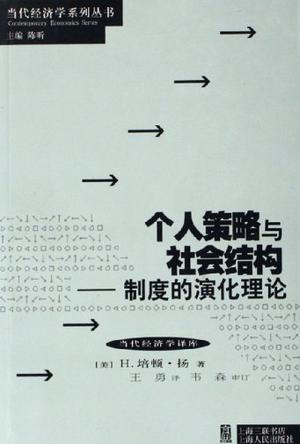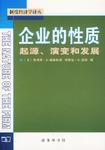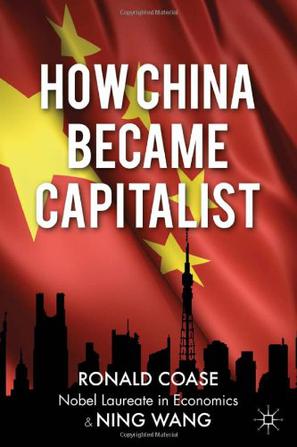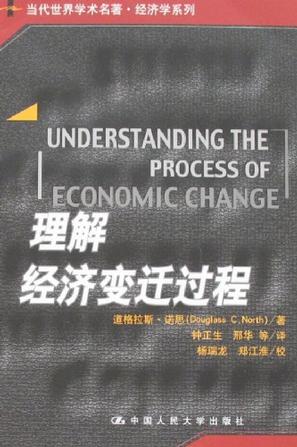-

个人策略与社会结构
《个人策略与社会结构》是根据1995年6月编者在希伯莱大学高级研究中心的经济理论夏季班系列讲座的基础上稍稍扩编而成的。《个人策略与社会结构》有两个目的。一是想为博弈理论的发展提出新方向,在这里博弈者将不是超理性的,而且信息是不完全的。《个人策略与社会结构》的第二个目的是想说明这种框架如何运用于社会经济制度的研究。 《个人策略与社会结构》系“当经济学译库”中的一种,是博弈论制度分析领域的权威学者培顿·扬的扛鼎之作的中译本,被认为是在博弈论制度分析研究领域迄今所能见到的最主要、最系统、最新、最高的理论文献成果。 -

企业的性质
《企业的性质:起源演变和发展》第一章是综述,然后是科斯发表于1937年的那篇经典论文以及他在本次研讨会上所做的三篇演讲。《企业的性质:起源演变和发展》还包括六篇参会论文和两篇受本次会议启发所撰写的论文。《法律、经济学与组织杂志》第四期(1988年春季号)刊登了《企业的性质:起源演变和发展》中除导论和科斯1937年的论文以外的全部论文。《企业的性质:起源演变和发展》是一本论文集,收录了罗纳德·科斯于1937年首次公开发表的经典论文《企业的性质》,以及科斯在1987年为纪念“企业的性质”发表50周年而举行的一次研讨会上所做的三篇演讲,还有科斯在获1991年诺贝尔经济学奖时所做的演讲。这些内容涉及到“企业的性质”的起源、意义和影响。从这四篇文章中,我们能看到科斯学术思想的形成、演变及其发展。这对于真正理解科斯及其学术思想至关重要。 -

Institutions, Institutional Change and Economic Performance
Continuing his groundbreaking analysis of economic structures, Douglass North develops an analytical framework for explaining the ways in which institutions and institutional change affect the performance of economies, both at a given time and over time. Institutions exist, he argues, due to the uncertainties involved in human interaction; they are the constraints devised to structure that interaction. Yet, institutions vary widely in their consequences for economic performance; some economies develop institutions that produce growth and development, while others develop institutions that produce stagnation. North first explores the nature of institutions and explains the role of transaction and production costs in their development. The second part of the book deals with institutional change. Institutions create the incentive structure in an economy, and organisations will be created to take advantage of the opportunities provided within a given institutional framework. North argues that the kinds of skills and knowledge fostered by the structure of an economy will shape the direction of change and gradually alter the institutional framework. He then explains how institutional development may lead to a path-dependent pattern of development. In the final part of the book, North explains the implications of this analysis for economic theory and economic history. He indicates how institutional analysis must be incorporated into neo-classical theory and explores the potential for the construction of a dynamic theory of long-term economic change. -

How China Became Capitalist
How China Became Capitalist details the extraordinary, and often accidental, journey that China has taken over the past thirty years in transforming itself from a closed agrarian socialist economy to an indomitable force in the international arena. The authors revitalize the debate around the development of the Chinese system through the use of primary sources. They persuasively argue that the reforms implemented by the Chinese leaders did not represent a concerted attempt to create a capitalist economy, but that the ideas from the West eventually culminated in a fundamental change to their socialist model, forming an accidental path to capitalism. Coase and Wang argue that the pragmatic approach of "seeking truth from fact" is in fact much more in line with Chinese culture. How China Became Capitalist challenges the received wisdom about the future of the Chinese economy, arguing that while China has enormous potential for growth, this could be hampered by the leaders' propensity for control, both in terms of economics and their monopoly of ideas and power. -

Structure and Change in Economic History
In this bold, sweeping study of the development of Western economies, Douglass C. North sets forth a new view of societal change. At the core of Professor North's investigation is the question of property rights, the arrangements individuals and groups have made through history to deal with the fundamental economic problem of scarce resources. In six theoretical chapters, Professor North examines the structure of economic systems, outlines an economic theory of the state and the ideologies that undergird various modes of economic organization, and then explores the dynamic forces such as new technologies that cause institutions to adapt in order to survive. With this analytical framework in place, major phases in Western history come under careful reappraisal, from the origins of agriculture and the neolithic revolution through the political economy of the ancient and medieval worlds to the industrial revolution and the economic transformations of the twentieth century. Structure and Change in Economic History is a work that will reshape many established explanations of the growth of the west. -

理解经济变迁过程
内容简介 在这本里程碑式的著作中,诺思提出了一种新的理解经济变迁过程的方式。二十年前,道格拉斯•诺思通过揭示经济绩效大体上是由支撑市场的制度类型及质量所决定的,激发了经济史上的一场革命。正如他在开启新制度经济学之门的两本经典著作中所表明的,产权和交易成本是基本的决定因素。这里,诺思阐释了不同社会是如何形成制度性基础的,这种制度性基础在很大程度上决定了它们的经济轨迹。 诺思认为,经济变迁在很大程度上依赖于适应性效率,即一个社会在创造生产性的、稳定的、公平的以及广为接受的制度上的有效性——而且更为重要的是,这些制度要足够灵活,从而在应对政治和经济反馈时能够被变更或被取代。虽然坚持了早期对制度的定义,即制度是约束人类行为的正式或非正式的规则,但是为了探究这些规则的演化以及经济变迁的深层次决定因素,诺思拓展了先前的研究。利用心理学家的最新研究成果,诺思把意向性作为关键变量,揭示了意向性是怎样成为社会学习的结果及其随后是怎样影响经济的制度基础的,进而影响其对不断变化的环境的适应能力。 本书不仅解释了过去的制度变迁,而且解释了当今各经济体之间的不同经济绩效。因此,这部大作也是改进发展中国家绩效的重要指南。 名家评介 这本由大师创作的简短著作将为人们广泛阅读、探讨和争论。它大胆地迈向很少有人涉足的领域,是一本比经济增长甚至是经济史更加雄心勃勃的著作。它的主题是经济变迁,并且敢于提出那些对于专业人士而言仍将迷惑多年的论题。 ——乔尔•莫可里,西北大学 正如诺思早期的经典著作《制度与制度变迁》引起了主导90年代的理解制度的革命一样,他的新著——《理解经济变迁过程》 ——寻求同样革命性的变迁。现在,诺思把认知成分融入这种分析:意识是怎样运行的,我们是怎样形成有关世界的信念和理解的,以及社会怎样解决——或没有解决——它们所面临的问题的。本书是诺思的上乘之作。 ——巴里•温加斯特,斯坦福大学政治学教授 在这本著作中,诺思再一次开创了经济研究的新前沿。他提倡探究人类意识,以寻求关于个体和社会获取的知识如何在文化上和制度上影响变迁过程的理解。他勇敢地闯入了大多数经济学家比较陌生的领域,如社会心理学和认知科学,并用这些发现深化了我们对当今时代最为迫切的经济问题的理解:现代技术有巨大的生产能力,可是为何许多经济体仍然未能实现繁荣? ——阿夫纳•格雷夫,斯坦福大学 这本著作使诺思的研究历程达到了顶点,并指明了解决当今经济学中最有价值但也最不易解决的问题的方向:制度是如何演化的。当第一次读这本著作时,我立即发现了它对我研究工作的意义,并开始反思有关经济体及其政府如何相互联系的几个基本想法。从诺思那里学到的东西改变了我们的思考方式,这种改变是对其智力影响的最好测度。 ——约翰•约瑟夫•沃利斯,马里兰大学